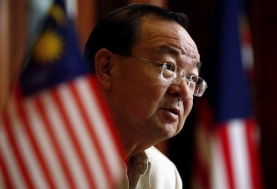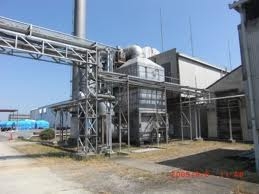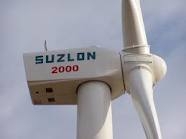News
Henan's 30MW Nanyang wind power phase II connected to grid
All 20 wind turbines of the 30MW Nanyang Fangcheng Wind Power Phase II have been connected to the grid for power generation on schedule. The project adopted Xinjiang Gold Wind’s GW87\1500 turbines, which is a new type of wind turbines specifically designed for Type 3 wind zones to fully utilize breeze for power generation. Since the first 15 turbines were put into operation on 14 November 2011, 4300MWh electricity has been produced with stable operation conditions.
Henan's 30MW Nanyang wind power phase II connected to grid
All 20 wind turbines of the 30MW Nanyang Fangcheng Wind Power Phase II have been connected to the grid for power generation on schedule. The project adopted Xinjiang Gold Wind’s GW87\1500 turbines, which is a new type of wind turbines specifically designed for Type 3 wind zones to fully utilize breeze for power generation. Since the first 15 turbines were put into operation on 14 November 2011, 4300MWh electricity has been produced with stable operation conditions.
4,500MW onstream by 2016
While Tenaga Nasional Bhd (TNB) still faces an erratic gas supply problem, a silver lining may emerge with the coming onstream of 4,500 megawatts (MW) by 2016. In fact, it might be boom years again for the power engineering business in the second half of 2012 and 2013, said OSK head of research Chris Eng. “The replacement of the first generation power purchase agreements (PPAs) with new contracts should be positive in the longer term for both the independent power producers and TNB, although the impact would only be felt in 2016,” he said. “With the gas price hike postponed and gas supply still erratic, we have cut TNB's earnings forecast in the short term. However, the new PPAs coming into force may lead to its capacity payment rates dipping in the long term,” he said. “TNB is a clear-cut post election play as it will likely get to enjoy more tariff hikes and most importantly, a coal cost pass-through after the general election,” he said. While the official reserve margin still stands at above 35%, the shortage of gas and the aging the power plants mean that the country's actual reserve margin is probably significantly lower. “As the first generation PPAs expire from 2015 to 2017, it would be crucial to start the competitive bidding process now to ensure that the new plants are ready by 2016. Without these new plants, Malaysia's reserve margin is likely to drop to 10% by August 2017,” he said. According to him, re-negotiation of the first generation PPAs had ground to a halt because TNB did not see the need to offer the first generation independent power producers (IPP) a discounted cash flow positive deal. There is, therefore, some 4,105MW of first generation capacity expiring between 2015 to 2017. Even with the expansion of 1,000MW at Janamanjung and another 1,000MW at Tanjung Bin, the country is short of 2,105MW of power, not to mention the expected growth in electricity demand. “With Bakun power in no way headed for Peninsular Malaysia, it would appear that we are on the cusp of a power plant building frenzy. This is reminiscent of 1993 when the first generation PPAs were first awarded and it was contracts aplenty for power engineers in Malaysia,'' he said. While all five first generation IPPs had actually submitted proposals for renegotiation of their PPAs, Eng viewed that Genting Bhd and Sime Darby Bhd might be less interested this time around, given the cessation of talks and the invitation for fresh PPA bids. “Genting has indicated that it is keen to sell its power assets and is left with only the 720MW Genting Sanyen CCGT in Malaysia while Sime Darby only owns the 440MW open cycle gas turbine (OCGT) peaking plant in Port Dickson. “The more serious bidders are likely to be MMC (with an effective generation capacity of 5,020MW of 23% of the peninsular's generation, Tanjong (440MW via Powertek and 720MW from Panglima Power) and YTL Power (1,202MW in Paka and Pasir Gudang),” he said. Overall, the industry is still faced with a shortage of gas supply but an erratic supply of gas had been flowing through the Bekok C bypass platform since September. Eng noted that there were days when TNB received less than 1,000 million metric standard cubic feet per day. Factoring in these issues, TNB's earnings forecast has been pared down by 13% for 2012 and 4% for 2013 by the research house. Meanwhile, Maybank Investment Research said there would still be challenges as gas supply was still low, which meant that TNB would still incur a hefty alternative fuel cost bill in the first quarter of 2012 for the supply shortfall.
EC seeks players with lowest cost for 4,500MW capacity
The Energy Commission (EC) says it expects the competitive bidding process for the 4,500 megawatt (MW) power-generation capacity to involve a combination of new and existing power plants. An EC official told StarBiz that the competitive bidding process was still in its early stage of inviting prospective bidders to register their interest, and that the power regulator was still working on the details of the plan. Nevertheless, he confirmed reports that the EC was targeting to have a total of 4,500MW power-generation capacity to come in through the bidding process. This, he said, was to replace the capacity of the first generation power-purchase agreements (PPAs) and to cater to future demand. “Basically, what we're looking for are players who can offer us the least cost,” he said, in response to queries about EC's notice on Tuesday calling for prospective bidders for the development of a gas-fired power plant in Peninsular Malaysia. Chin says more energy needed to meet future demand. The EC had said in the notice that the power plant was to sell its capacity and energy to Tenaga Nasional Bhd (TNB) under a new PPA. The site or sites would be made available by the EC, or alternatively, prospective bidders could propose new sites for EC's consideration. According to Energy, Green Technology and Water Minister Datuk Seri Peter Chin, 4,500MW more of gas-based power generation would be required by 2017 to replace retired capacities and meet future energy demand in the peninsula. The first generation PPAs, accounting for around 4,100MW of gas-based generation capacity, would be expiring in 2015 or 2016. TNB had in recent weeks announced that the first generation PPAs, involving YTL Power Generation Sdn Bhd, Segari Energy Ventures Sdn Bhd, Port Dickson Power Sdn Bhd, Powertek Bhd and Genting Sanyen Power Sdn Bhd, would not be renegotiated and would be allowed to lapse. Adding to the future power supply pressure in the country was the expected growth of electricity demand by an average of 4% per year in the next five to 10 years. While the independent power producers (IPPs) under the first generation PPAs would see their contracts lapse, TNB president and chief executive officer Datuk Seri Che Khalib Mohamad Noh had recently said they could still participate in the bidding process for new licences that would be held by way of open tender. TNB, which had been facing an increasing challenge of rising fuel costs that ate into its profit margin in recent years, had for years been subject to high-capacity payments to IPPs under the existing PPAs, especially the first generation ones that were signed in the mid-1990s. Under the deal, the national power company was obliged to pay relatively “high” fixed charges to IPPs for the supply of their power-generation capacity, regardless of whether it was fully utilised. It appeared, therefore, the terms and conditions of the PPAs had always tilted strongly in the IPPs' favour. “The idea to allow the first generation PPAs to lapse is to pave the way for an open-tender process and more competitive pricing for TNB,” an analyst said. “It is clear why TNB prefers to have an open-tender process. For one thing, it would push players towards greater efficiency and result in lower input prices for the supply of power, both of which would benefit TNB, and ultimately, consumers,” he explained, while noting the fact that it was very difficult for TNB to increase the selling price of electricity to end-users, as the prices were currently controlled by the Government. here
Malaysia expects competitive bidding for 4,500MW project
Malaysia's Energy Commission is targeting to have a total of 4,500MW power-generation capacity involving a combination of new and existing power plants through bidding.
Indonesia's PLN to operate 3 new coal-fired plants
Perusahaan Listrik Negara will operate three new coal-fired power plants in Banten.
TPPs struggle with shrinking coal stocks
Inadequate supply of coal from Coal India has been cited as one of the major reasons for the coal crunch facing the thermal sector. This irregular and short supply of coal has thus, forced several power stations to operate below their installed capacities. The website carries here, details of the coal stock position at various TPSs in the country as of December 14, 2011. This is categorized according to name, capacity, critical coal stock and reasons behind the shortage. Some of the plants facing acute coal shortages are as under: Dadri NCTPP (1,820 MW) -- Due to less receipt of coal from Central Coalfields Limited (CCL) Kahalgaon TPS (2,340 MW) -- Due to less receipt of imported coal because of transportation constraint of Railways Unchahar TPS (1,050 MW) -- Due to less receipt from CCL Rihand STPS (2,000 MW) -- Due to less receipt of coal from Northern Coalfields Limited (NCL) Sanjay Gandhi TPS (1,340 MW) -- Due to unloading constraints Simhadri TPS (1,500 MW) -- Due to less receipt from SCCL
Malaysia's energy commission commences bids for new power plant - AWER
The Energy Commission has moved to open up the bidding process for the replacement of first generation Power Purchase Agreement (PPA). This was revealed by Association of Water and Energy Research Malaysia (AWER) President S. Piarapakaran in a statement. He did not elaborate. While conglatulating the Energy Commission for the move which he described as bold, he called for a transparent and fair bidding process. "Opening up the bidding up to 49 percent foreign equity will allow Malaysia to have more industry players that can invest in better and efficient technology," he said. He also urged the Energy Commission to blacklist first generation independent power producers that did not renegotiate their PPAs from this bid.
Adani Power puts 6,500 MW expansion plan on hold
Lack of clarity regarding coal supplies forced Adani Power to put its plans for capacity expansion of 6,500 megawatts on hold.
Tohoku Electric utlilizes 34-MW gas turbine
Tohoku Electric has started trial power output from the 34-megawatt No.6 gas turbine unit at its Niigata energy plant.
Meralco inks 7 year coal supply deal
Semirara Mining Corp has signed a seven-year deal to sell up to a 410-megawatt power capacity to Meralco.
Suzlon bags 166.30 MW turbine orders in India
Suzlon Energy Limited announced cumulative orders of 166.30 MW in India over a two month period.
NHPC seeks expeditious approval for hydro project
NHPC wants Uttarakhand to address issues to its hydro project to facilitate the signing of the implementation agreement.
"Cultural revolution" helpful in boosting China-Scotland renewable energy partnership
Scotland's First Minister Alex Salmond said a "cultural revolution" of sorts is needed to promote "real understanding" between China and Scotland.
NHPC releases Rs 10 crore aid for 240 MW HEP project
Hindustan Construction Company has finally obtained financial assistance throughf an interest bearing advance of Rs 10 crore from the NHPC.
Meralco inks 7 year coal supply deal with Semirara
Semirara Mining Corp signed a seven-year deal to sell up to a 410-megawatt power capacity to Meralco.








 Advertise
Advertise


















